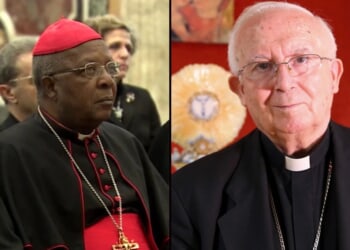Albie Amankona is a broadcaster, financial analyst, vice-chair of LGBT+ Conservatives, and co-founder of Conservatives Against Racism.
I don’t often talk about my working-class roots. Mostly because people wouldn’t believe me — I sound like a posh Londoner. But the truth is, I became one.
My mum grew up in Oldham, the first generation of her family not to live in absolute poverty and the first to go to university. My Ghanaian grandparents sent my dad back to Ghana as a child because they couldn’t afford to raise him here. I grew up mixed-race, low-income and fatherless. That’s where I come from.
We’re often told that white working-class boys are uniquely suffering, left behind by a society preoccupied with every other minority group.
Some of the loudest voices making that case – friends and former colleagues of mine, politicians like Robert Jenrick and Nigel Farage or journalists like Patrick Christys and Allison Pearson – speak almost exclusively about white boys, wielding identity politics for some while dismissing it for others.
But white working-class boys are not uniquely suffering. If you claim that, you’re no different from the anti-racist campaigners who argue the same for black boys. That, too, is just race-baiting.
Just 18 per cent of white British pupils on free school meals (FSM) achieved a standard pass in English and Maths at GCSE. Black Caribbean? 22.2 per cent. Mixed white and black Caribbean? 19.2 per cent. Traveller kids? A staggering 3.3 per cent. These numbers don’t scream racial inequality in the way some claim – and yet still they miss the point.
Because if you’ve lived it, you know the numbers are never the whole story. In modern Britain, 58 per cent of children eligible for FSM are raised in lone-parent households, as are 51 per cent of black children, and 37.5 per cent of mixed-ethnicity children, particularly white and black Caribbean.
Growing up, you learn early that no one is coming to save you. Not the state. Not the schools. Probably not even your own dad.
For me, childhood was tough. As an adult I’ve been on antidepressants and in therapy for years. It’s easy to blame the mental health crisis on smartphones, social media, or the cost of living. Yes, those things matter — but they don’t tell the full story. What’s overlooked is a deeper breakdown in our culture and our families. Shifts that can’t be explained away by complaints about “mass migration” or “a lack of youth clubs.”
The working class isn’t white lads in flat caps furious about immigrants, or knife-wielding black boys convinced every white person is racist. Let’s say we end immigration and knife crime — what happens the next morning? Do we all hold hands and sing Kumbaya on streets paved with gold? Of course not.
The political chattering classes are stuck in an episode of Little Britain, thinking in stereotypes. These caricatures don’t reflect the families I know. The working class is black, brown, white, mixed, Traveller – families clinging on as best they can. What ties them together is disadvantage.
The woke left has its part to play.
Schools lecture kids about gender identity while leaving them unable to read. Councils slash children’s services while hiring diversity officers. Kids are told they’re either victims or oppressors based solely on skin colour. Climate hysteria has replaced any sense of patriotism.
But the woke right is at it too, from Carl Benjamin to Harrison Pitt; even Matt Goodwin engages, at times, in this anti-Enlightenment nonsense. Some on the very online right promote open racism dressed up as realism. Talk of “remigration” – as if British-born black and brown kids should be sent “home” to countries they’ve never even seen – is not serious politics.
Then along comes a show like Adolescence, which tells a working-class story. And what happens? The very people who claim to care about white working-class boys like the protagonist start complaining: “Why isn’t it about a black family? Why not a Muslim one?”
They miss the point entirely. The national conversation around Adolescence was nauseating not just because of the racialised tone of some criticisms, or the absurd ‘art to policy arc’ now expected after Mr Bates vs The Post Office – but because the drama wasn’t even about boys.
It’s about a girl who’s been killed by the protagonist in an act of vengeance. It explores the grief of her friends (her best friend is a black girl), the boy’s family (two of whom are female), the wider community, and the institutions (police, schools, courts) trying to make sense of it all. The cast reflects a mix of races and sexes. The wrong lessons were learned.
Banksy supposedly said that “Art should comfort the disturbed and disturb the comfortable.” That’s worth remembering if you’re ever angry about casting. Adolescence helds up a mirror and asked: what if this were your son? Your daughter? Your street? Your family?
At its core, it’s about culture, and the breakdown of basic Abrahamic teachings: treat others as you would wish to be treated; forgive, don’t repay evil for evil; and love thy neighbour – even the broken, the guilty, the unlikeable.
It’s about what happens when communities forget the things that once made them resilient: strong families, shared values, and a moral framework. Not enforced, but quietly upheld, by a common national faith.
It’s not rocket science. We either build strong families, cohesive communities, and the economic foundations for success, or we don’t.
My grandparents’ generation built it for the Boomers. If we fail to do the same for Gen Z and Gen Alpha, the price won’t be paid by think tankers, journalists or MPs. It’ll be paid by kids like the one I was – and they’ll carry that cost long after the rest of us are gone.


![Stephen Miller Announces New Goal for ICE Mass Deportation Effort [WATCH]](https://www.right2024.com/wp-content/uploads/2025/05/Stephen-Miller-Announces-New-Goal-for-ICE-Mass-Deportation-Effort-350x250.jpg)

![Simone Biles Defends Trans Pitcher and Mocks Riley Gaines, It Doesn’t Go Well [WATCH]](https://www.right2024.com/wp-content/uploads/2025/06/Simone-Biles-Defends-Trans-Pitcher-and-Mocks-Riley-Gaines-It-350x250.jpg)
![LAPD Praises 'Peaceful' Rioters as They Set Cars on Fire and Attack Feds [WATCH]](https://www.right2024.com/wp-content/uploads/2025/06/LAPD-Praises-Peaceful-Rioters-as-They-Set-Cars-on-Fire-350x250.jpg)

![LA’s Mayor Karen Bass Gets Torched for Her Response to Riots for Criminal Illegal Aliens [WATCH]](https://www.right2024.com/wp-content/uploads/2025/06/LAs-Mayor-Karen-Bass-Gets-Torched-for-Her-Response-to-350x250.jpg)









